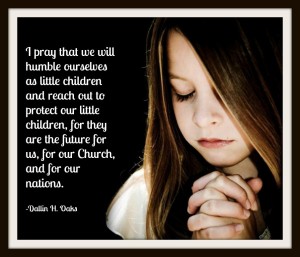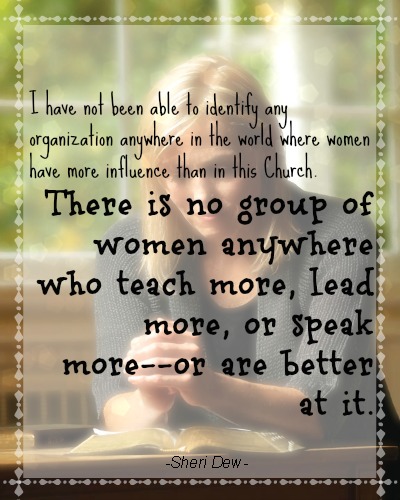How to Pray
As a member of The Church of Jesus Christ of Latter-day Saints (inadvertently referred to as the “Mormon Church”), the doctrine of prayer is not new for me. Since I was born and raised in the Church, my parents taught me how to pray when I was very young. The steps they taught me were to:
- First, address God as Heavenly Father;
- Second, give thanks for His blessings;
- Third, ask for blessings or favors;
- Finally, close in the name of Jesus Christ.

They also taught me that prayers should be sincere, offered with real desire and belief that God was listening. We prayed all the time; as a family in the morning and again at night, blessings on the food, and invocations and benedictions for church meetings. However, it wasn’t until I was in college that I really started to have the meaningful conversations with Heavenly Father that personal prayers are supposed to be, and started to understand why we should pray.
Praying About My Problems
Life got pretty hectic as a college senior: projects, final exams, job searching, and dating all seemed overwhelming. I knew in my head the doctrine of prayer, and that I could pray and receive guidance and answers. But I also knew a bit about the world, and the turmoil taking place because of natural disasters, government collapse, war, and famine. I thought that some widow in Syria or a starving child in Africa surely had more of God’s attention than I did. Although my life was busy, I was safe and healthy, and more privileged than a good majority of people on the globe. My concerns about an internship and dating had to seem small and insignificant when compared with tragic deaths or severe trials that other people were experiencing. I thought that I shouldn’t trouble Heavenly Father with my problems, that I could figure my life out on my own. After all, I thought, I’ve got it pretty good, and I need to be independent.
I continued to pray every day, and was grateful for the blessings I had in my life. But I stopped asking for guidance, determined that other people were more important and that God didn’t have time to worry about my problems.
However, while listening to General Conference, a twice-yearly event when living prophets speak to church members and the world, I remembered another important doctrine that Mormons believe: “I am a child of God.” (See Romans 8:16 and Children’s Songbook 2.) We believe that God is the Father of our spirits. And as God, He is the perfect Father, who loves His children and wants to bless them—all of them. Just because Heavenly Father blesses a person in another country does not mean He cannot bless me, too. He doesn’t have a limited number of blessings; He has the ability to love and bless all of His children, everyone on earth. Sometimes, though, He can’t bless us or guide us unless we come to Him in prayer and ask. I learned that my problems are important to God, and that He will answer my prayers.
Why Pray?
Praying about problems is just one of the reasons to talk with God. Some other reasons to pray include the following:
- To express gratitude for blessings. David A. Bednar, one of the living prophets who guides the Church, instructs members to “periodically . . . offer a prayer in which we only give thanks and express gratitude. Ask for nothing; simply let our souls rejoice” (“Pray Always,” November 2008 Ensign). I have found that when I give thanks sincerely, I can focus more on what I have than what I don’t have.
- To gain knowledge and a witness of the truth. We believe that anyone can know whether or not a doctrine or religious idea is true by praying with a desire to know. For example, a person learning about The Church of Jesus Christ of Latter-day Saints might pray to know whether or not Joseph Smith, the founder of The Church of Jesus Christ, is a prophet. The Book of Mormon, a book of scripture testifying of Christ written by ancient prophets on the American continent, offers the promise that “by the power of the Holy Ghost ye may know the truth of all things” (Moroni 10:5). Any person who prays can feel the Holy Ghost, or the Spirit, witness to them the truth.
- To be forgiven. When Jesus Christ taught His disciples how to pray in Matthew 6, He prayed: “And forgive us our debts, as we forgive our debtors” (Matthew 6:12). When we make mistakes, we must pray to be forgiven. As Latter-day Saints (Mormons), we believe that forgiveness is possible for everyone through the Atonement of Jesus Christ, but also that we must ask for forgiveness. We must show that we are truly sorry for our mistakes, and pray to receive forgiveness.
- To receive guidance from the Holy Ghost. Sometimes called the Spirit or the Holy Spirit, the Holy Ghost can comfort, guide, and testify of truth. When we pray to know the truth, or for help with our problems, it is the Holy Ghost that helps us to know what to do and believe.
What I Learned
I had always known how to pray. I kneeled down, closed my eyes, and addressed Heavenly Father. I prayed almost every day, sometimes for fervently than others. After I understood more fully why we pray, and that Heavenly Father loved me and answered my prayers, I prayed more often. My prayers were more sincere, and I felt more peace in my life. Sure, I still have problems, and the world still has problems. Praying didn’t magically fix everything that was wrong in my life. But it did give me peace and comfort, and greater happiness.
Prayer is not just for Mormons. God is the Father of everyone’s spirits, not just Latter-day Saints’. He loves all of His children, not just some certain group of them. Praying is communicating with God, our Heavenly Father, and He is willing and anxious to bless and help us all.
Megan is a graduate of BYU-Idaho and recently married member of The Church of Jesus Christ of Latter-day Saints. She is a writer and avid reader, and loves music, hiking, and her family.



